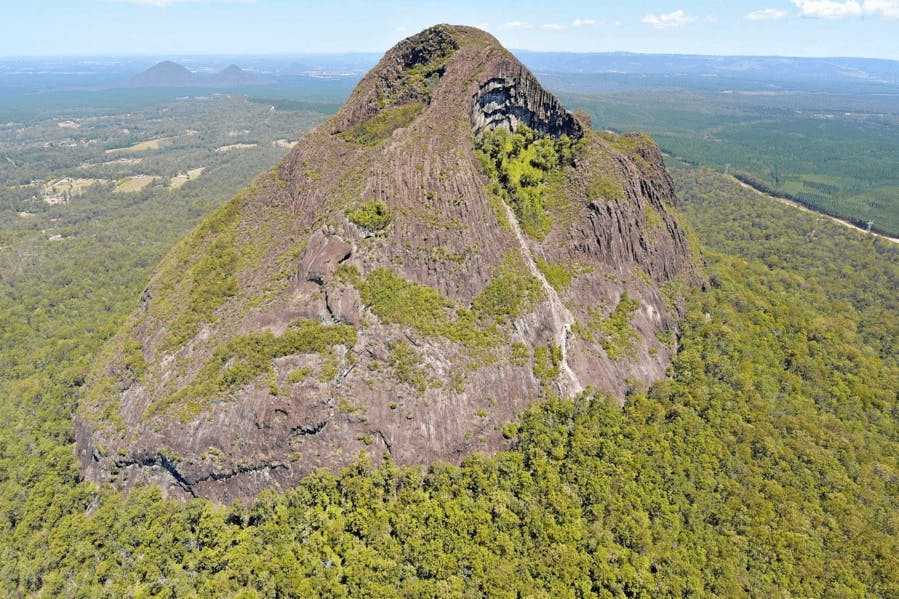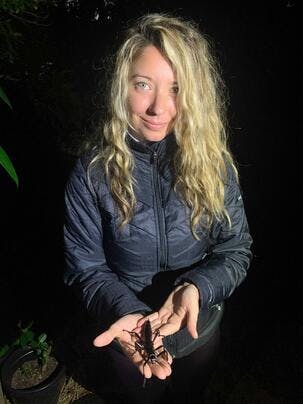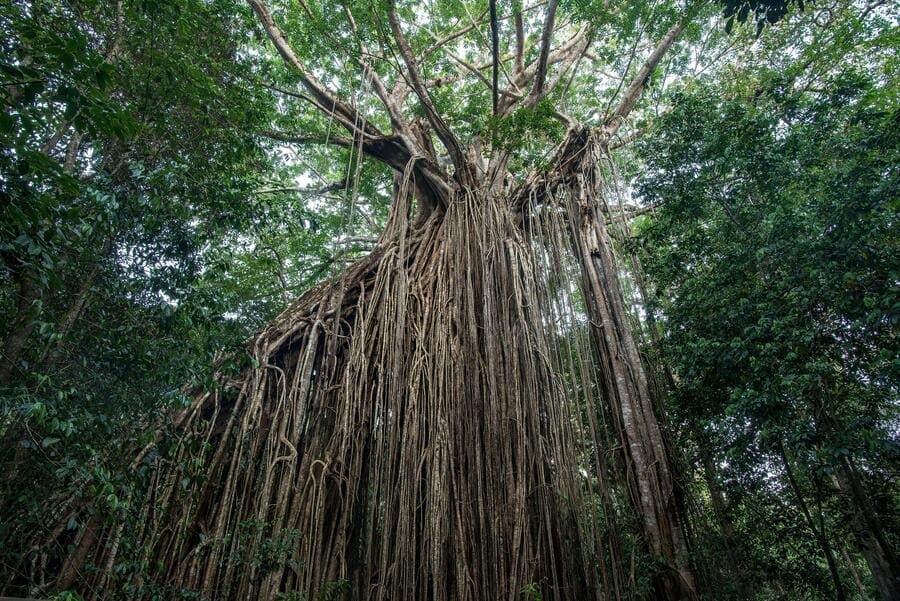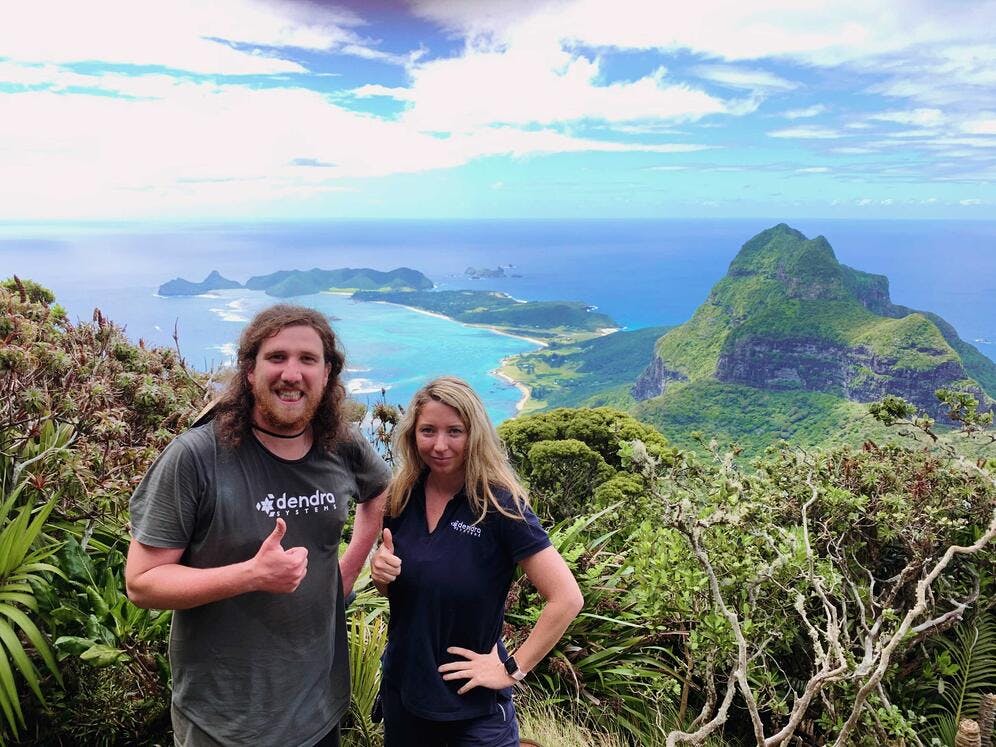Meet Nadine Nolan, our Field Data Ecologist

Q. What is your story?
“I start way back in the beginning because all the women in my family are scientists, from chemists to biologists, working on really cool areas such as pathology collection and cell staining. For me, it’s always been about the environment.
I grew up in Cairns, a tropical North Queensland, where I was always hiking and collecting spiders. My favourite subject at school was always biology, so it was never even a doubt in my mind where I was headed. I always knew I was going to be a scientist, specifically within the biology discipline. I also wanted to focus on where I would make the most impact and drive change whilst being passionate about it, and for me, it always came back to improving the environment. That’s why I decided to do an ecology major at university and a minor in zoology to obtain both the plants and animals knowledge. It really wasn’t until my honours year that I had the “now what” moment.
This is where it starts aligning with my role at Dendra since I started researching pathogenic fungus that affected plants: invasive ecology (see article). I then began to investigate different weeds species and different insect species, becoming a specialist in invasion ecology, and I also started using drones in my work which linked really well with Dendra.”


Q. Why Dendra Systems?
“I spent almost eight years in a university setting, doing a lot of research, but I felt like I wasn’t really making an impact at scale. Whilst I was really passionate about research, finding knowledge gaps, and running experiments, I was really interested in seeing the research’s real-world application and having the platform to transform the findings into reality.
That’s where I started looking outside the academic context for companies that were really making a change in the environment and restoring ecosystems. That‘s when I came across Dendra, and I thought, WOW, this is amazing, and they are having an impact on a global scale.
When it comes to why Dendra, one of the big things for me was Susan, looking up to her, a woman CEO leading the way in restoration and using a really novel way to do it. Everything I read about the company demonstrated that they were using the latest technology to achieve restoration goals quickly and scalably, which was a WOW factor for me. From drones and aerial mapping technology to AI, we keep training our systems to identify plant species, animal species, erosion features and provide ecosystem insights.
The scale at which we can do this is what is really going to make an impact and change the world. Everyone talks about making a difference, but Dendra has an actually achievable vision, and I thought that was really cool.”
Q. What does your day to day look like?
“My job isn’t just a field ecologist; it’s also looking at GIS, help training the AI, knowing the capabilities of the drones and then linking everything all together to deliver products to the land managers, whether they be mining, national parks, and giving them something that they can actually use in real-time to manage their land.
I remember when I first started, it was like wearing the hat of many jobs in this company, which helps you grow really quickly and learn new skills because you have that background and understanding of the company as a whole.
The main component of my job is doing flora and fauna surveys in the field, but there is so much more to it. From understanding the drone capabilities to being able to communicate with clients and getting them excited. We constantly need to be innovative to connect what we are doing in the field with the insights that we generate on the myDendra portal, finding new opportunities to evolve our capabilities, such as integrating extremely accurate GPS systems that have never been used for mapping and plant identification before!
I am text block. Click edit button to change this text. Lorem ipsum dolor sit amet, consectetur adipiscing elit. Ut elit tellus, luctus nec ullamcorper mattis, pulvinar dapibus leo.


The job evolves as we go along. We need to constantly do more research and development in different areas, coming up with new ideas, figuring out how to implement them, and making sure they are scalable and valuable for land management. We are always trying to find solutions to our ever-evolving situation at Dendra, which makes every day really exciting, whilst applying academic or traditional ecology skills and methodologies such as the BAM (Biodiversity Assessment Methodology) to increase the confidence level of what we do.
Finally, there is also a team element, mentoring the data ecologist, training them up and getting them involved in different initiatives to keep everyone motivated and passionate about what we are trying to achieve.”
Q. Favorite part of your job?
“Sometimes it’s really nice to just get into the field and do flora and fauna surveys, connecting with nature, especially in places like Lord Howe Island (see case study) where you’ve got these beautiful, pristine remnant ecosystems that are thousands of years old. You get to walk through and connect with them. It’s exciting because you want to find the weeds so land managers can take action and keep these places pristine.”
Q. Most valuable lesson learned?
“The most valuable lesson I’ve learned in life is that if the end goal is worth it and that if the current path you are on is not working, don’t be afraid to jump off that path and try to find a new path. There are always multiple ways to get to a point, and don’t be afraid to try multiple ones and see which one works best to achieve your goal. Talk to other people in different departments; for example, I always go to the engineering department to talk about ecology stuff just to get a different perspective.“
Q. Biggest challenges you’ve had to overcome?
“The biggest thing I had to overcome was to make that decision to leave the academic world and jump into the industry world. Moving from a space where there are a lot of processes and regulations established and that feels safe because you’ve known for many years to a new fast paced environment where if you have an idea you are empowered to go try it, it was scary but totally worth it. All the rules change and you have to go and make your own path.”
Q. Any role models?
“I have 2 role models in my life. The first one is my mum. She is amazing, really hard-working, and after having a break from the industry and science work to focus on a more personal life, she jumped back in and had to re-learn and re-adapt since things change really fast in that industry. She was stressed and dealt with a lot of anxiety about getting back in, but she did it, and she persevered, which really inspired me. I learned from her to go for it and not be afraid; no matter what happens, even if it doesn’t work out, it’s gonna put you on a path to somewhere else, and you’ll be good. The only thing worse is being stuck in the same spot and never moving.
The second one is Elena. I’ve had lots of managers throughout my life, but none of them, who’s also a really good friend and at the same time someone who also inspires you. She is so passionate, confident and not afraid to be a powerful female leader; she is someone to aspire to.”
Q. What did you want to be when you grew up?
“When I was in grade six, we were given a choice to pick up an assignment in whatever area we wanted, and I picked a biology project on the bioluminescence of jellyfish on which I got an A+++. From that point, I knew I wanted to work with animals, plants and the environment, definitely an area biology oriented. Every weekend my parents would take us out to national parks, hiking, visiting waterfalls, snorkeling on the reef, and I knew this is what I wanted to do with my life. I knew that if I could spend as much time in these environments, it wouldn’t really feel like work, would it? I also knew that I wanted to go to university because I think that knowledge is power, especially as a woman, which is something my nana would always tell me when I was a kid.”
Q. Outside interests or hobbies?
“Hiking! I hike so much. One of my favorite hikes is Mount Beerwah, on the Sunshine Coast in Queensland, which is this amazing volcanic formation that kind of sticks straight up out of the earth, but once you get to the top, it overlooks the whole Sunshine Coast. It takes almost an entire day to get up and back, but the view is amazing, and it’s really fun.”Outside interests or hobbies?
Q. Favorite plant?
“I love figs. My dad bonsais and he got me into it a long time ago, but I am terrible at it, so I only bonsai figs, which are impossible to kill. Figs are amazing; you get these giant figs that you see in Brisbane and in Newcastle, oh and in Lord Howe Island, they have these amazing ones that can walk across the land by putting out the roots that drop down and then grow from there again, it’s mind-blowing!
Q. Favorite animal?
“The velvet worm or the peripatus worm (Onychophora), which is basically a missing link in the evolutionary chain between annelids and arthropods/insects. They look velvety and all colourful, except they are carnivores. So if they weren’t small, they would be terrifying. It has these giant retractable jaws that come out of his mouth and with a sticky silk like glue they trap and eat their prey paralyzed but alive. If you want to discover more about these 400-million-year-old caterpillars, watch the following video:”
Q. Word/s that describe you the best?
“To be kind and show kindness. That is what I live by every day, whether it’s to other people or the environment. You can’t go wrong if you’re always kind.”
Q. What is your superpower?
“Being resilient and adaptable, I quickly learn new things and adapt to new environments, which is something I had to do a lot in my life.”